Liquid holdup measurement of permittivity-changing gas-liquid two-phase flow by multimode microwave resonant cavity
IF 5.2
2区 工程技术
Q1 ENGINEERING, MULTIDISCIPLINARY
引用次数: 0
Abstract
The accurate measurement of gas–liquid two-phase flow has been a key issue in multiple engineering fields but remains challenging. During the long-term monitoring of the liquid holdup in gas–liquid two-phase flow, the permittivity of the flow may change frequently due to inevitable environmental fluctuations, and the measurement errors can accumulate and become significant. In this work, a multimode resonant cavity based on the perturbation method is developed to achieve the accurate measurement of liquid holdup in long-term monitoring despite permittivity changes. The detailed design process, focusing on sensitivity optimization and waveguide characterization, is described. By simultaneously considering the resonant frequency and quality factor under multiple resonant modes, a compensation method for holdup measurement is proposed that adaptively mitigates the adverse impact of property changes without the need of frequent calibrations. Experiments covering the full holdup range are conducted using white oil and air. By mixing #68 white oil with #10 white oil in different ratios, the permittivity changes of the liquid phase are simulated. Results show that the full-range measurement errors are less than 0.8% with the permittivity unchanged, with a rooted mean standard error (RMSE) of 0.31%. When the permittivity of the liquid change by up to 3.18%, the errors are reduced from up to 9.84% to less than 2.05%, with an RMSE of 0.67%, by applying the compensation method. This manifests that the proposed method can effectively mitigate cumulative measurement errors induced by environmental changes, making it viable for long-term monitoring without frequent off-line calibrations.
用多模微波谐振腔测量变介电常数气液两相流的液含率
气液两相流的精确测量一直是许多工程领域的关键问题,但仍然具有挑战性。在对气液两相流的含液率进行长期监测时,由于不可避免的环境波动,流动的介电常数会发生频繁的变化,测量误差会累积并变得显著。本文提出了一种基于微扰法的多模谐振腔,可以在介电常数变化的情况下实现长期监测中液含率的精确测量。详细的设计过程,重点是灵敏度优化和波导特性,描述。同时考虑多种谐振模式下的谐振频率和质量因子,提出了一种自适应减轻特性变化不利影响而无需频繁校准的持率测量补偿方法。用白油和空气进行了全含率范围的实验。通过将68号白油与10号白油按不同比例混合,模拟了液相介电常数的变化。结果表明,在介电常数不变的情况下,全量程测量误差小于0.8%,均方根标准误差(RMSE)为0.31%。当液体介电常数变化达3.18%时,误差由高达9.84%降至2.05%以下,RMSE为0.67%。这表明所提出的方法可以有效地减轻由环境变化引起的累积测量误差,使其能够在不频繁离线校准的情况下进行长期监测。
本文章由计算机程序翻译,如有差异,请以英文原文为准。
求助全文
约1分钟内获得全文
求助全文
来源期刊

Measurement
工程技术-工程:综合
CiteScore
10.20
自引率
12.50%
发文量
1589
审稿时长
12.1 months
期刊介绍:
Contributions are invited on novel achievements in all fields of measurement and instrumentation science and technology. Authors are encouraged to submit novel material, whose ultimate goal is an advancement in the state of the art of: measurement and metrology fundamentals, sensors, measurement instruments, measurement and estimation techniques, measurement data processing and fusion algorithms, evaluation procedures and methodologies for plants and industrial processes, performance analysis of systems, processes and algorithms, mathematical models for measurement-oriented purposes, distributed measurement systems in a connected world.
 求助内容:
求助内容: 应助结果提醒方式:
应助结果提醒方式:


